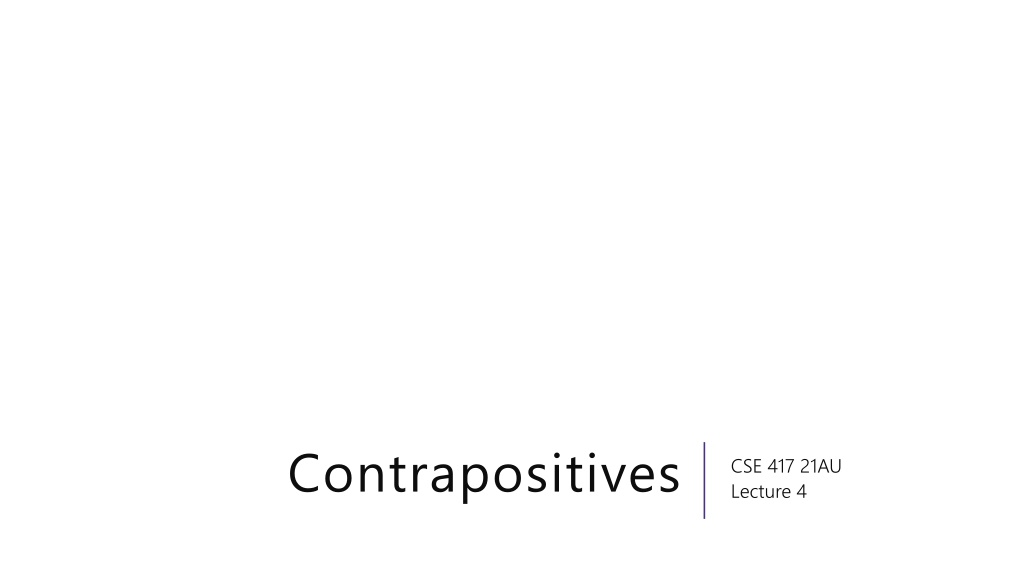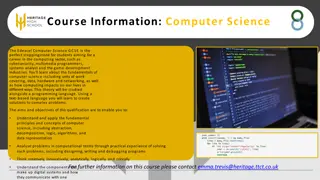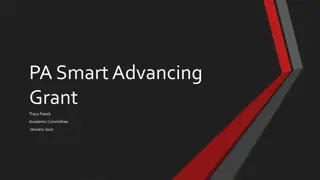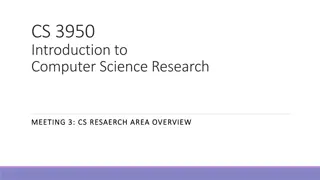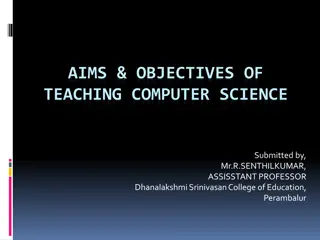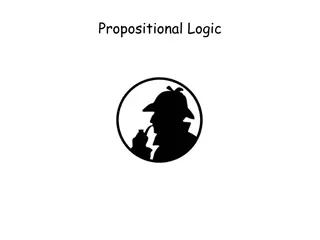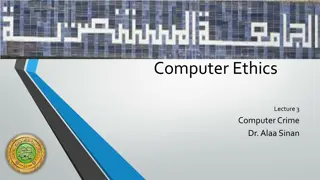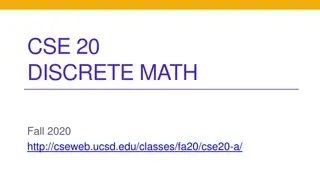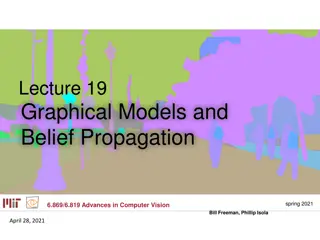Understanding Implications and Contrapositives in Computer Science
Explore the concepts of implications, contrapositives, vacuous truth, and logical reasoning in computer science through examples and explanations. Learn how to determine the truth value of statements based on given conditions and scenarios in algorithm design.
Download Presentation

Please find below an Image/Link to download the presentation.
The content on the website is provided AS IS for your information and personal use only. It may not be sold, licensed, or shared on other websites without obtaining consent from the author. Download presentation by click this link. If you encounter any issues during the download, it is possible that the publisher has removed the file from their server.
E N D
Presentation Transcript
Contrapositives CSE 417 21AU Lecture 4
Announcements HW1 out tonight! Due in one-week, 11:59 PM on Wed. Oct. 13. There are two types of problems: mechanical usually: execute an algorithm, come up with an example of something or a very short proof. long-form usually: design an algorithm, write code for an algorithm, think about an algorithm in the real world, or write a longer proof. The directions include how many of each count. You can submit extras, we count the best ones.
Announcements We try to keep the problems in each category approximately the same difficulty, but that isn t always possible. It s a good idea to read all of them. Coding questions (since they re autograded) are due with HW8 at the very end of the quarter (i.e., you can think about it as having infinitely many resubmissions). Otherwise, on each later homework, you can submit one old problem to be (re-)graded.
When is an implication false? Computer scientists think of every implication as true or false. Implications are promises promises can be broken (or wrong), so they can be false! The implication ? ? is false when we can show the promise has been broken. That is when ? is true, but ? is false.
True or False? For the purposes of this slide, Alice always carries an umbrella, Bob never carries an umbrella, and it is sunny out right now. If it is sunny right now, then Alice has her umbrella. If it is raining right now, then Alice has her umbrella. If Bob has his umbrella, then it is raining right now. If it is sunny right now, then Bob has his umbrella.
True or False? For the purposes of this slide, Alice always carries an umbrella, Bob never carries an umbrella, and it is sunny out right now. If it is sunny right now, then Alice has her umbrella. If it is raining right now, then Alice has her umbrella. If Bob has his umbrella, then it is raining right now. If it is sunny right now, then Bob has his umbrella. True True True False
Vacuous Truth Some of those probably felt weird. The implication ? ? is vacuously true It s true, but only as a default value it s true precisely because we could not actually use it for anything. Why is this the rule? See the extra slides. vacuously true when ? is false. ? ? ? ? True True False False True False True False True False True True
Contrapositives There are two equivalent ways to write an implication ? ? and ? ? How do I know they re equivalent? ? ? ? ? ? ? ? ? True True False False True False True False True False True True False False True True False True False True
Contrapositives There are two equivalent ways to write an implication ? ? and ? ? How do I know they re equivalent? ? ? ? ? ? ? ? ? True True False False True False True False True False True True False False True True False True False True True False True True
Contrapositives To take a contrapositive, switch the if-part and then-part and negate them both. If it is raining, then I have my umbrella. If I do not have my umbrella, then it is not raining Try it yourself: If I m on campus, then I have my Husky card.
Why take contrapositives? Some implications are easier to prove in their contrapositive form. Let s practice some more direct proofs.
Even/Odd Let ? be an integer. If ?2 if even, then ? is even. ?2= 2k for some integer ?.
Even/Odd Let ? be an integer. If ?2 if even, then ? is even. Try taking the contrapositive and proving that instead!
Even/Odd Let ? be an integer. If ?2 if even, then ? is even. What s the contrapositive? If ? is odd, then ?2 is odd. ? = 2? + 1 for some integer ?, ?2= 2? + 12= 4?2+ 4? + 1 = 2 2?2+ 2? + 1
One more vocab word Converse The converse of ? ? is the implication ? ? The converse is not necessarily the same as the original implication! Consider: If it s raining, then I have my umbrella vs. If I have my umbrella, then it s raining.
Gale-Shapley If ? is not matched to by Gale-Shapley, then at least one of or ? does not have the other as their first choice.
Sums Let ?,? be integers. If ? + ? 15 then ? 8 or ? 8
Why vacuous truth? Why do we call vacuous implications true? Why not call them false ? Or neither true nor false ? Answer 1 Answer 1: It s the convention. Everyone else does it; if you try to call it something else, everyone else will be very confused. Answer 2 Answer 2: Implications can be general enough to be sometimes vacuous and sometimes not. Consider If a number is even and prime, then it is equal to 2 Depending on what you choose for number the implication might be vacuous or not! We d really rather not think of the implication as sometimes true, and sometimes neither true nor false or worse yet sometimes true and sometimes false true is the only realistic choice.
